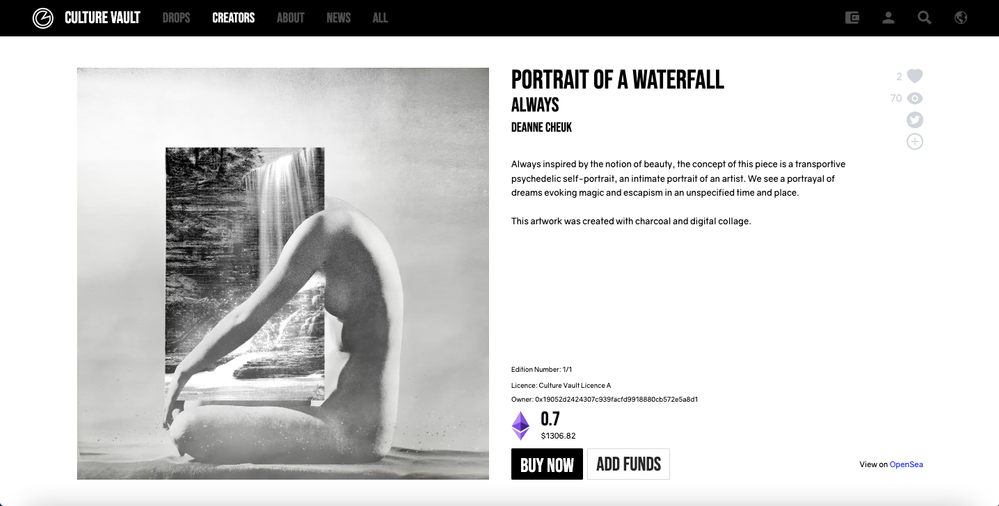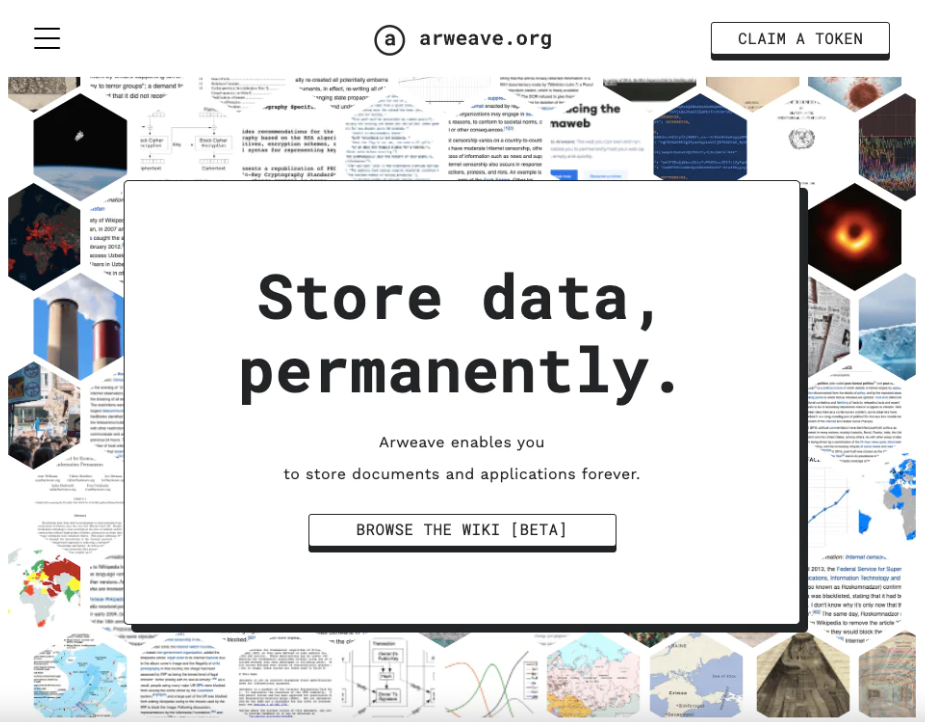Written by Harriet Maher
July 26, 2022
Culture Vault integrates Arweave for Data Storage and Protection on the ‘Permaweb’
If you own a valuable piece of art worth thousands of dollars, you wouldn’t leave it in your unlocked back shed or out on the front step. You wouldn’t give it to someone you don’t know, and you wouldn’t leave it exposed to potential water, fire or unintentional damage. You’d keep it somewhere safe, store it in your house with extra security measures, or entrust it to a highly respected custodian so it never goes missing.
Just like physical items of significant value, crypto assets also need to be stored safely and sustainably for the long term. Currently, most NFTs use something called IPFS (InterPlanetary File System), a digital filing system that operates using content identifiers (CIDs) which can be likened to a unique cryptographic fingerprint. The CID is stored within the NFT’s metadata and provides a link to the digital asset’s location (usually off-chain). The idea is that if you search for a particular NFT, IPFS will ask its entire network if any of its nodes have the corresponding data for the unique CID being requested. If any of them do, the data is retrieved.

BAYC and IPFS Holders I’m looking at you…
Risks have been identified with IPFS, mainly because it presents the chance, however small, for the digital asset’s data to be lost. In some cases, entire NFT collections have disappeared because of a ‘rug pull’, leaving nothing but a 404 error message behind. These ‘rug pulls’ are infrequent exit scams that involve hyping a project to gain traction on social media, and then taking the project offline while pocketing the investors’ funds. The servers are shut down and the owners of the NFTs are left empty-handed. Aside from intentional scams and deliberate removal of files from a centralized server, there is still no guarantee that the files that NFTs reference – files stored by an artist or by centralized servers – will be around forever. As a subscription service, IPFS users pay to keep their links valid over time. If for any reason, users aren’t able to continue making payments, IPFS is suddenly de-incentivized to store data, and it may eventually be lost.
Culture Vault has chosen Arweave as an alternative solution to IPFS to help mitigate these risks through their decentralized, immutable approach to permanent data storage. Arweave is a network that connects those with disk space to spare with those who need permanent storage. Rather than a subscription service, Arweave charges a one-off fee upfront to pin content to the Arweave blockchain forever. The project has been praised by Sotheby’s, a giant in both the traditional and crypto art markets, as ‘the most robust decentralized storage solution’, and is becoming the go-to storage protocol for some of the space’s leading NFT projects. Arweave helps to provide users with greater guarantees that digital assets won’t be lost, become inaccessible, or destroyed whilst preserving data integrity and redundancy.

Deanne Cheuk’s work on https://culturevault.com
How does Arweave achieve such high levels of data availability and security with its protocol? They use something called ‘block weave’ technology, which is specifically designed to ensure its users have permanent and uninhibited access to their content. Rather than being stored off-chain, where information is prone to potential attack or degradation, Arweave’s data is stored directly on-chain using a set of blocks that each contains data and links back to multiple previous blocks within the network. This interwoven data structure uses a “Proof of Access” consensus mechanism, which requires miners to prove their access to old data before mining new blocks.
Also, unlike traditional blockchains where miners typically output large amounts of electricity in order to reach consensus, miners in the Arweave network are incentivized to replicate the valuable information already stored in the network by receiving tokens. This makes them more energy-efficient and means that Arweave’s mining mechanism is much more sustainable overall.

At Culture Vault, we’re thrilled to be using the superior data storage solution offered by Arweave’s innovative technology. It allows us to guarantee that the NFTs minted by us will have digital assets that remain permanently available. For collectors, this means that if they purchase an NFT from Culture Vault, they can rest easy in the knowledge that the data which makes their NFT unique, beautiful, and valuable is forever stored on Arweave’s secure, decentralized network. For creators minting and listing their work on Culture Vault, it guarantees that their NFTs are protected, stored, and preserved into perpetuity. It also provides a sense of security that their work will never be removed from a server, or that the server will one day go offline. Together with Arweave, we are excited to create, preserve, and write NFTs into the history of the ‘permaweb’.
This piece was originally written for Culture Vault and published on https://culturevault.substack.com/ on 01 June 2022
Related Articles
Weekend Viewing: 13-15 January
It's a new year and there is a brand new lineup of shows opening around the world . Here are some of my top picks for exhibitions to check out this weekend, both online and in person. From biennials to blockbusters and everything in between, this short list will...
My Robot Could’ve Made That
There is a well-known book on modern art called “Why Your Five Year Old Could Not Have Done That.” It speaks to the once-common dismissals of abstract and ‘primitive’ styles of art as childish; art that we now prize above any other genre. But perhaps the next...
Just Stop.
Why using art as a vehicle for protest isn't the solution There’s been a lot of art in the news lately, but not necessarily for the right reasons. We’re used to seeing Picasso, Van Gogh and Munch’s names splashed across the pages of newspapers and the internet, but...



